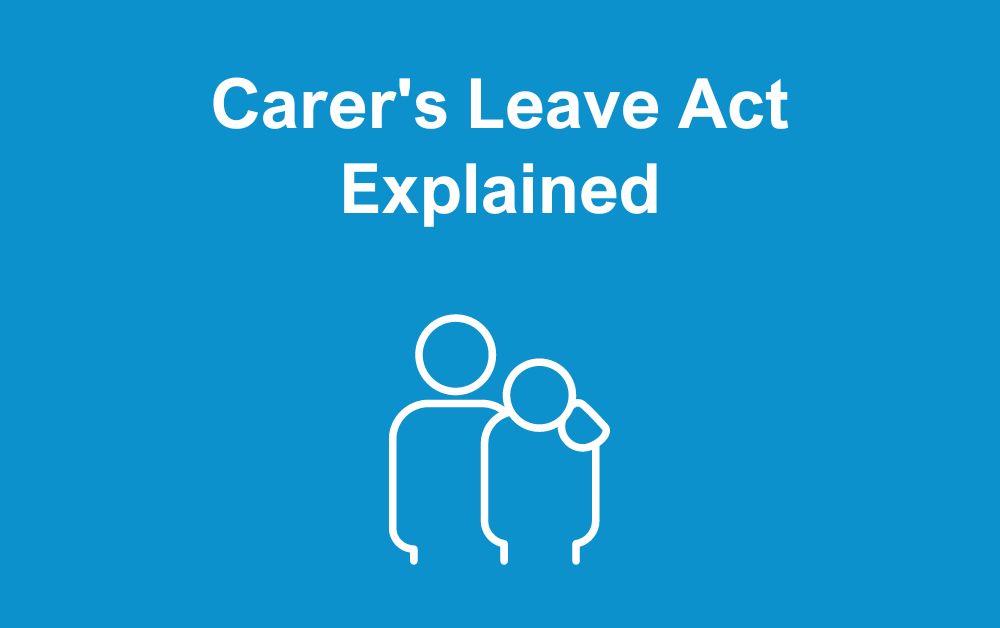Here’s everything employers need to know about managing carer’s leave in the workplace.
Eligibility Criteria
- Day-One Right: Employees are eligible for carer’s leave from the first day of their employment. This provides immediate support for new hires with existing care commitments, which may help attract and retain talent.
- Unpaid Leave: This will be unpaid. Employers do not need to provide remuneration during this period but are encouraged to discuss flexible working or alternative paid leave options if suitable.
- Dependant Definition: This type of leave is designated for employees caring for a dependant with a long-term care need. A dependant can be a spouse, partner, child, parent, or any individual who relies on the employee for ongoing care.
Differences Between Carer’s Leave and Time Off for Dependants
Carer’s leave is designed for planned, ongoing care needs, distinguishing it from time off for dependants which this is meant for emergency situations. While time off for dependants allows employees to handle unexpected events, this covers planned and foreseeable care activities that require the employee’s time and attention.
Conditions for Carer’s Leave
- Notice Requirements: Employees must provide reasonable notice when making a request. This enables employers to accommodate the leave within the business’s operational needs.
- Right to Postpone: Employers may postpone this leave for up to one month if the leave would cause undue disruption to the business. This flexibility allows employers to manage workflow demands while still supporting employees’ care responsibilities.
- One Week Limit: It is capped at one week within a rolling 12-month period. This ensures that the time taken is proportionate and manageable for both employee and employer.
Addressing Carer’s Leave Requests
When an employee requests leave, employers should:
- Review the Notification: Ensure the request has been made with sufficient notice and confirm that it meets the criteria.
- Assess Business Needs: Consider if the timing of the leave could significantly impact business operations. If so, consult with the employee to explore potential alternatives or postponements within the one-month allowance.
- Document the Process: Maintain records of requests, approvals, and any decisions to postpone, ensuring a transparent and consistent approach.
Handling Detriment and Dismissal Concerns
Employers must ensure that employees are not penalised or dismissed for taking carer’s leave. Under this new right, any employee who feels they have been treated unfairly as a result of taking leave can file a complaint with the Employment Tribunal. To mitigate risks and support a positive workplace culture, it’s essential to:
- Educate Management: Ensure all managers understand new regulations and the importance of non-discriminatory practices.
- Review Policies: Update company policies and procedures to align with legislation, reflecting a supportive stance towards employees’ caregiving responsibilities.
- Encourage Open Communication: Foster a workplace culture where employees feel comfortable discussing their caregiving needs. This can prevent misunderstandings and strengthen employee loyalty.
Implementing Carer’s Leave as a Workplace Benefit
While carer’s leave is unpaid, offering it as part of a comprehensive support strategy can enhance employee morale, loyalty, and productivity. Employers can further support their workforce by considering:
- Flexible Working Arrangements: Offering flexibility in work hours or location can help employees balance their care responsibilities with job requirements.
- Additional Paid Leave Options: Employers may choose to provide additional paid leave or unpaid leave options for employees with caregiving responsibilities. This demonstrates a commitment to employee wellbeing.
Carers UK
Carers UK advocated for the right to Carer’s Leave, collaborating with Wendy Chamberlain, Liberal Democrat MP for North East Fife, to push the Bill towards becoming law.
Helen Walker, Chief Executive of Carers UK, said:
“The Carer’s Leave Act coming into force is a huge step forward for millions of carers, which recognises the vital importance of their caring role and empowers them to ask for support in the workplace – in the form of unpaid Carer’s Leave – knowing that they have a legal entitlement to this.
“Juggling work with caring responsibilities isn’t easy and without the right support, this can take its toll. Too many skilled and valued workers are leaving employment due to the stress of balancing work and unpaid care.
“Now every employer in the country must recognise carers in the workplace, employees can be confident speaking about their caring role – kickstarting a crucial conversation about the support they need to stay in work, which matters not just for carers, but for employers and the economy, too.”
Conclusion
Carer’s leave marks a significant step forward in supporting employees with caregiving responsibilities, creating a more inclusive and understanding workplace. By embracing this new right, employers can demonstrate a commitment to supporting their workforce. Therefore, resulting in improved employee engagement and retention. If not already, employers should prepare by updating their leave policies. They must educate management, and build an environment where employees feel supported in their caregiving roles.
Check out full terms and conditions of the new regulations here.







